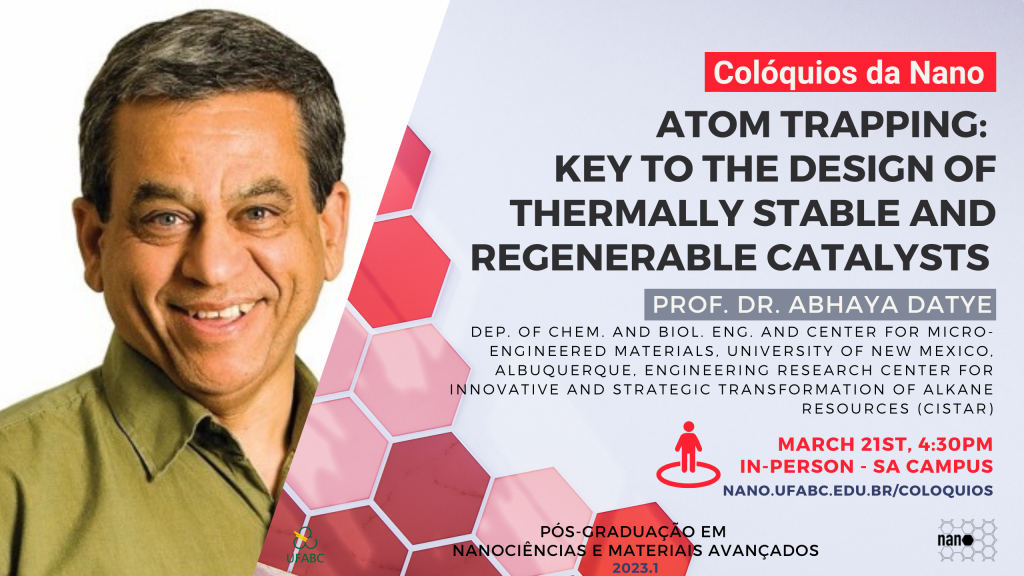
Resumo:
Palestrante: Prof. Dr. Abhaya Datye (University of New Mexico)
Título: Atom Trapping: Key to the design of thermally stable and regenerable catalysts
Data: 21/03/2023 – Auditório da Pós-Graduação, Andar 8, Bloco B, Santo André. Inscreva-se para certificados
Resumo: Heterogeneous catalysts represent the mainstay of the chemical industry, and a large majority involve nanoparticles on a support. Decreasing size of the nanoparticles leads to better utilization of the precious metals, with the highest atom efficiency being achieved when the metal is atomically dispersed in the form of isolated atoms. Isolated atoms become mobile at elevated temperatures, causing agglomeration into nanoparticles. Our research is focused on developing methods to control the growth of particle size and the transformation of nanoparticles into isolated single atoms [1-3].
Supports differ in their ability to maintain small particles. The figure below shows STEM images of three catalysts that contain 1 wt% Pt synthesized using the same amine precursor. The catalysts were all calcined at 500 °C in air to decompose the precursor. It is evident that very different sized Pt particles are formed. The ceria support contains isolated Pt atoms, the alumina support shows sub-nanometer sized particles while the MgAl2O4 support shows larger particles. The conventional term used to describe these differences is metal-support interactions (MSI), which is meant to suggest bonding of the metal nanoparticle with the oxide support. But the term MSI fails to capture the underlying mechanism that leads to these observations. We have characterized these differences in catalyst supports in terms of their ability to trap atoms. We learnt that ceria supports help generate a stable and fully regenerable Pt catalyst that can change reversibly from single atoms into metallic nanoparticles [3]. The understanding of atom trapping derived from ceria supports can be translated to other oxide supports. This will impact not only automotive exhaust treatment (where catalysts are exposed to high temperature) but also other industrial reactions such as propane dehydrogenation or methane oxidation and dry reforming, where high temperatures are required. The presentation will focus on the understanding of atom trapping and its application for design of thermally stable and regenerable catalysts [4].
References
[1] T.W. Hansen, A.T. Delariva, S.R. Challa, and A.K. Datye, Sintering of Catalytic Nanoparticles: Particle Migration or Ostwald Ripening? Accounts of Chemical Research, 2013. 46(8): p. 1720-1730.
[2] J. Jones, H.F. Xiong, A.T. Delariva, E.J. Peterson, H. Pham, S.R. Challa, G.S. Qi, S. Oh, M.H. Wiebenga, X.I.P. Hernandez, Y. Wang, and A.K. Datye, Thermally stable single-atom platinum-on-ceria catalysts via atom trapping. Science, 2016. 353(6295): p. 150-154.
[3] H.F. Xiong, S. Lin, J. Goetze, P. Pletcher, H. Guo, L. Kovarik, K. Artyushkova, B.M. Weckhuysen, and A.K. Datye, Thermally Stable and Regenerable Platinum-Tin Clusters for Propane Dehydrogenation Prepared by Atom Trapping on Ceria. Angewandte Chemie-International Edition, 2017. 56(31): p. 8986-8991.
![[Colóquios da Nano] [Colóquios da Nano]](https://grcmlesydpcd.objectstorage.sa-saopaulo-1.oci.customer-oci.com/p/OQwcvnO-c63O08Gc2Kv4OTbJttj5ik60dguiDIyyQ0wuo5SWn-jHOLW9wNbylNqI/n/grcmlesydpcd/b/dtysppobjmntbkp01/o/media/doity/eventos/evento-191101-banner.jpeg)